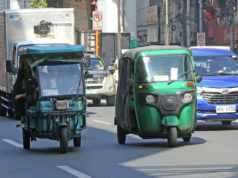PAL, Cebu Pacific raise fares as fuel cost rises
By Denise A. Valdez
LOCAL airlines have started imposing higher fares for domestic and international flights after the Civil Aeronautics Board (CAB) approved a fuel surcharge matrix to address the rising price of jet fuel.
Philippine Airlines Inc. (PAL) and Cebu Air, Inc. (Cebu Pacific) said they had started implementing a fuel surcharge on Wednesday, Sept. 19, to respond to the effects of growing fuel expenses.
Cebu Pacific President Lance Y. Gokongwei told reporters on the sidelines of an air transport forum in Makati City on Monday that the airline had rolled out updated airfares after the CAB’s issuance of a fuel surcharge matrix last month.
Alexander G. Lao, president of Cebu Pacific subsidiary of Cebgo, Inc., said the airline had followed “Level 3” of the surcharge matrix, which means an addition of as low as P74 for short distance flights. Examples of these flights are those from Cebu to Bacolod, or Cebu to Tagbilaran.
For international flights, a Level 3 surcharge means an additional airfare of P1,425 for those connecting Manila to Dubai or Melbourne, Australia.
Maria Socorro R. Gonzaga, PAL vice-president for external affairs and partnerships, confirmed to reporters that the airline had started charging higher fares last week. This was after PAL filed an application to the CAB when the surcharge matrix became effective mid-September.
Mr. Lao said while the fuel surcharge is not meant to offset all costs, it is expected to help the company recover some of its losses.
“Fuel surcharge is only to recover a portion of the cost. I think it’s 70% or 80% of the incremental fuel cost. But it does help,” he said.
Philippines AirAsia, Inc. said it had filed an application with the CAB on Friday but had yet to get the regulatory board’s approval.
Cebu Air, which operates under the trade name Cebu Pacific, saw a 24% drop in net income during the first half at P3.309 billion. This was mainly attributed to the rising price of jet fuel and the weakening of the Philippine peso.
According to the International Air Transport Association (IATA), the cost of jet fuel as of Sept. 14 reached $90.83 per barrel, 28.49% higher than in the same period last year and 2.96% higher compared with the cost last month.
Transportation Undersecretary for Aviation Manuel Antonio L. Tamayo previously said allowing airlines to impose a fuel surcharge was necessary to keep them from suspending flights just to cope with ballooning expenses.
“We have to let the airlines survive instead of cancelling flights, sacrificing quality of service,” he had said.
PAL’s listed parent firm PAL Holdings, Inc. reported higher spending in the first half due to the rise in fuel costs, recording a 21.7% increase in flying operations to P41.012 billion.
In a text message, PAL Spokesperson Cielo C. Villaluna told BusinessWorld the surcharge would help cushion the impact of rising fuel prices on the airline’s operations.
“It partially helps a carrier recoup extraordinary expenses brought about by such price hikes. Fuel surcharge is computed per route, based on distance. The imposition of fuel surcharge is allowed to help sustain the viability of airline operations,” she said.



